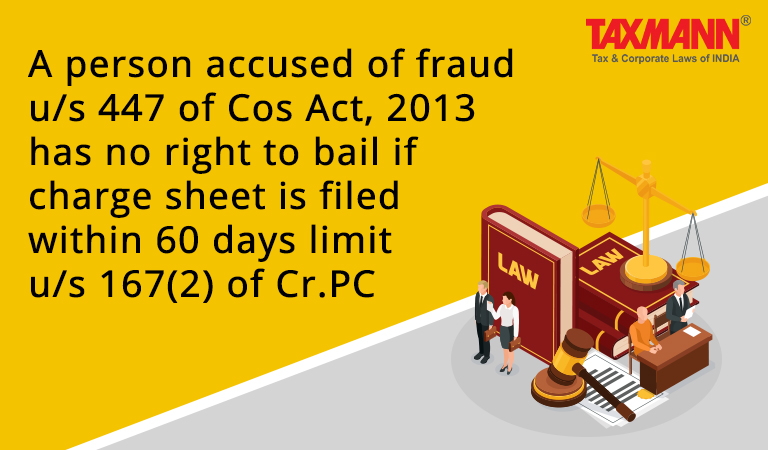A person accused of fraud u/s 447 of Cos Act, 2013 has no right to bail if charge sheet is filed within 60 days limit u/s 167(2) of Cr.PC
- News|Blog|Company Law|
- 2 Min Read
- By Taxmann
- |
- Last Updated on 9 February, 2022

Case Details: Serious Fraud Investigation Office v. Rahul Modi - [2022] 135 taxmann.com 98 (SC)
Judiciary and Counsel Details
-
- L. Nageswara Rao and B.R. Gavai, JJ.
Facts of the Case
In the instant case, the respondent-directors of Adarsh Group of Companies and LLPs were accused of committing an offence under Section 447 of the Companies Act, 2013, Section 120-B read with Sections 417, 418, 420, 406, 463, 467, 468, 471, 474 of the Indian Penal Code, 1860 (“IPC”).
The Special Court rejected their applications for statutory bail on the ground that the charge sheet was filed before the expiry of 60 day period prescribed in proviso (a) to Section 167(2) of the CrPC. The High Court considered the regular bail applications filed by Respondents and directed their release on bail on the ground that they were entitled to statutory bail. The High Court reasoned that Trial Court has not taken the cognizance had not been taken by the court before the expiry of 60 days.
The Serious Fraud Investigation Office (SFIO) submitted that the High Court committed a serious error in granting statutory bail to Respondents, even though the complaint was filed well before the expiry of 60 days from the date of the remand. An egregious error had been committed by the High Court in holding that cognizance also has to be taken before the expiry of the 60 days, or else, the accused would be entitled to statutory bail under Section 167(2), CrPC.
It was argued that the statutory bail under Section 167(2), CrPC can be granted only in a case where the investigation was not complete within the prescribed period and not otherwise. Respondents stated that the judgment of the High Court is contrary to the law laid down by this Court in Suresh Kumar Bhikamchand Jain v. State of Maharashtra & Anr.
On appeal, the question was raised before the Supreme Court – Whether an accused is entitled to statutory bail under Section 167(2), CrPC on the ground that cognizance has not been taken before the expiry of 60 days or 90 days, as the case may be, from the date of remand?
Supreme Court Held
The Supreme Court held that the accused was not entitled to statutory bail under the CrPC on the ground that a trial court had not taken cognizance of the charge sheet filed by the probe agency before the stipulated 60 or 90-day period. The accused cannot demand statutory bail as a matter of right on the ground that cognizance of the offence also had not been taken within the said 60-day period. Therefore, the Supreme court allowed the appeals and set aside the High Court’s order.
Disclaimer: The content/information published on the website is only for general information of the user and shall not be construed as legal advice. While the Taxmann has exercised reasonable efforts to ensure the veracity of information/content published, Taxmann shall be under no liability in any manner whatsoever for incorrect information, if any.

Taxmann Publications has a dedicated in-house Research & Editorial Team. This team consists of a team of Chartered Accountants, Company Secretaries, and Lawyers. This team works under the guidance and supervision of editor-in-chief Mr Rakesh Bhargava.
The Research and Editorial Team is responsible for developing reliable and accurate content for the readers. The team follows the six-sigma approach to achieve the benchmark of zero error in its publications and research platforms. The team ensures that the following publication guidelines are thoroughly followed while developing the content:
- The statutory material is obtained only from the authorized and reliable sources
- All the latest developments in the judicial and legislative fields are covered
- Prepare the analytical write-ups on current, controversial, and important issues to help the readers to understand the concept and its implications
- Every content published by Taxmann is complete, accurate and lucid
- All evidence-based statements are supported with proper reference to Section, Circular No., Notification No. or citations
- The golden rules of grammar, style and consistency are thoroughly followed
- Font and size that’s easy to read and remain consistent across all imprint and digital publications are applied



 CA | CS | CMA
CA | CS | CMA
